Chapter Links (Timestamps)
- Intro (0:00)
- Not only gringos (00:32)
- Cuencanos overcharge each other too (01:47)
- Taxis (02:59)
- Restaurants (03:34)
- Fruit & vegetable markets (04:28)
- Real estate (05:00)
- Visas (06:18)
- Cars (07:22)
- Tips to Avoid (08:09)
- Impact of gringo pricing (09:45)
- Positive experiences aplenty (10:58)
- Wrapping Up (11:46)
¡Hola! Welcome to YapaTree, your go-to source for detailed information about Cuenca. Today, we delve into a sensitive topic: out-of-town pricing, often referred to as the “gringo tax” or “gringo pricing” or even being “gringoed”.
While it’s true that expats may experience higher prices in certain situations, it’s essential to recognize that this issue extends beyond the expat community. In this video, we explore specific examples of out-of-town pricing and share strategies to minimize its impact on your budget.
Let’s get started!
Understanding Out-of-Town Pricing
Before we dive into the details, let’s address the term “gringo tax.” While it’s commonly used, it oversimplifies the issue and neglects the fact that other groups, such as expats from other Latin American countries and non-locals from within Ecuador, also face similar challenges. Recognizing this broader scope, we prefer to use the term “out-of-town tax” or “out-of-town pricing” to reflect the core issue accurately.
Examples of Out-of-Town Pricing
Taxis
Like in many other places worldwide, tourists may encounter longer routes to increase fares. However, taxi fares in Cuenca are generally inexpensive, and the overall impact on your wallet is minimal. The base fare is $1.50, which increases to $1.75 after 6 PM. While tipping is not mandatory, rounding up the fare is customary.
Restaurants
Most restaurants in Cuenca are honest and display prices on their menus. Some higher-end establishments may include a service charge, but it’s essential to note that this fee goes to the owners, not the service staff. English-speaking restaurants catering to expats may charge slightly higher prices, but it’s our opinion that this can be attributed to offering different types of food and quality rather than exploiting customers.
Fruit and Vegetable Markets
Negotiation is common in these markets where prices are often not displayed. Don’t hesitate to engage in friendly negotiations and ask for a little extra (“yapa“) to get a fair deal. Remember, it’s a two-way street, and positive interactions can lead to enjoyable experiences and unexpected extras.
Real Estate
In the real estate sector, it’s not uncommon for some agents to try to rent or sell properties above the market price, targeting unaware expats. Transparency and understanding the market prices are crucial to avoid overpaying. Working with a trustworthy agent who has a good understanding of local costs and processes is invaluable. View our Cuenca real estate offerings.
Visas
Visa service providers mainly cater to out-of-town clients, so it’s hard for us to say they charge “gringo prices.” However, it’s important to be cautious and research common fee structures and strategies used by visa attorneys and facilitators before making any financial commitments. And if you still think that a high price equals high quality, I urge you to check this post (& video) on Ecuador visa myths.
Cars
If you decide to purchase a used car, be aware that many Cuencanos prefer verbal negotiations without listing a price. Engaging a trusted local to assist you in negotiations is advisable. Websites like PatioTuerca provide valuable information on car prices, helping you navigate the market effectively.
Strategies for Navigating Out-of-Town Pricing
1. Know your prices
Compare prices and shop around to identify any significant differences. Consult with current residents and ask locals what they pay to gain a comprehensive understanding of the market.
2. Embrace the local culture
Show genuine interest in local customs, learn a few basic phrases in Spanish, and demonstrate respect for the local culture. Building positive relationships can help reduce the impact of out-of-town pricing.
3. Seek recommendations from locals
Locals have firsthand knowledge of fair pricing and can guide you towards authentic experiences and places with reasonable prices.
4. Support local businesses
Shopping at local markets, dining at neighborhood restaurants, and engaging in local activities not only helps the community thrive but also allows you to develop pricing benchmarks and find better deals. Not sure which businesses to support? The YapaTree Membership card offers deals with around 50 quality businesses and you can view current deals here.
Why Saying No to Overpaying Matters
Nobody wants inflation to increase more than it currently is. This may potentially price locals out of the market for even the most basic of necessities. Advocating for fair pricing and being aware of market dynamics, you contribute to a sustainable and balanced local economy.
While it’s essential to be vigilant about fair pricing, it’s equally important not to exaggerate every minor discrepancy. This is a cash society and simple maths mistakes can be common when receiving your change. Not every discrepancy is gringo pricing. Overreacting to small price differences can lead to misunderstandings and unnecessary frustration.
Wrapping Up
Armed with these strategies for navigating out-of-town pricing in Cuenca, you can enjoy an authentic and budget-friendly experience in this beautiful city. Remember to know your prices, embrace the local culture, seek recommendations from locals, and support local businesses. By doing so, you’ll not only have a more enjoyable stay but also contribute positively to the community. Don’t forget to check out our YapaTree membership card program, which offers exclusive offers from various businesses in Cuenca.
Further reading:
View full video transcript
Dealing with Cuenca’s Gringo Tax – Transcript
Jason 00:01
Hola, today we’re talking about all things gringo tax, including some tips on how to avoid it. Vamos.
Jason 00:08
Jason from YapaTree here. YapaTree is Cuenca’s source of detailed boots on the ground information. We have a strong real estate division Two. Today’s video is somewhat of a delicate topic. Gringo pricing or gringo tax is something that you would hear a lot of expats complain about wherever you end up living in the world. We’ll get into some specific gringo tax examples and our suggestions for limiting how much this affects you.
Jason 00:32
But before we get there, I do want to address something and that is the name Gringo Tax. This does great on me a lot because it is a misrepresentation of the core overpricing issue and by labeling it as something that only affects gringos, we’re putting ourselves at the center of this issue and I think by doing so over emphasizing how much this actually affects gringos or expats in general. Now, I’m not debating that gringos do get charged more in certain circumstances, but what normally gets omitted from this conversation at all the other groups that are also subject to being overcharged.
Jason 01:08
This includes expats from other Latin American countries such as Colombia, Peru, and Venezuela. And importantly, anyone that sounds like they are from another city in Ecuador also goes through very similar issues. Take my partner Michelle. She’s from Quito and speaks native Spanish. But she is not from Cuenca and this is very clear to Cuencano’s, so she faces the very same overpricing issues as gringos. The main difference is that she understands the negotiating culture and can call someone out on their overpricing BS and still maintain a calmness that can cut through it and we generally end up paying the standard price.
Jason 01:47
We can even take it down to the local level as two different Cuencano’s can also be charged different prices depending on how they look. The local saying for this is “va de acuado a la cara del pato” and the little translation is something like “goes according to the face of the duck”. So according to the saying, different ducks get charged different prices depending on how their face looks. The central assumption here is that the closer the buyer looks to the seller, the more the seller trusts the buyer, has the same knowledge as them and subsequently offers them better pricing.
Jason 02:22
For example, if we take the market context, a lot of store holders are from indigenous communities. Therefore according to this saying, they are more likely to give better pricing to indigenous locals. And so whilst this phenomenon does seem to exist on numerous levels here in Cuenca, I do believe a much more accurate name for it is out of town tax or out of town pricing. As the core issue stems from shops and service providers recognizing an accent or other physical attributes that clearly point to the buyer being from somewhere else and then they assume that they don’t know the standard pricing in Cuenca.
Jason 02:59
Thanks for indulging my little rant. Now that we’ve established a slightly less gringo centric name, let’s get to some specific examples where out of town pricing can occur. Taxis. Taxis and the good old tourist route to get somewhere. I’m sure you’ve come across this one in your home country too. The good news is that taxis in Cuenca are really cheap, so whilst I’m not condoning overcharging, the overall impact on your wallet is generally trivial. The minimum fair in Cuenca is $1.50 which increases to $1.75 after six PM. And no, tipping is not mandatory, but rounding up is common.
Jason 03:34
Restaurants. In my experience, most restaurants here are honest and prices are normally easy to find on menus etc and so you know exactly what you’re paying for ahead of time. Some restaurants at the higher end do automatically include a service charge which can be a little bit of a surprise and this fee does normally go to the owners, not the service staff, so maybe take this into consideration if you are going to try and tip your server. And yes, there are absolutely some English speaking restaurants in Cuenca that focus on expats as their core audience. And sure, some of these do charge more than other restaurants and cafes. But whether you consider this gringo pricing is really up to you. My view on it is that these cafes and restaurants are providing a different type of food and quality at a specific price point. And to me this is not gringo pricing. If they were charging locals less than sure that would be a very different story.
Jason 04:28
Fruit and vegetable markets. This is perhaps the best place for you to start learning how to negotiate with Cuencanos. Displayed prices are rare, so it’s very easy for them to inflate them a little bit. But it is not a one way street. You’re very welcome to push back a little bit, and provided you do it in a positive and fun manner, you do not need to worry about offending anybody. You can even ask for a little yapa, or something extra, and perhaps you’ll walk away with a little more than you were expecting, rather than feeling like a victim that’s been overcharged.
Jason 05:00
Real estate buying and renting. Yapatree operates a real estate division, so we’re very close to this one. And unfortunately it is common for other agents to do whatever they can in order to gain some quick money. This can range from the obvious, like trying to rent or sell a property above the market price in the hope of attracting an oblivious gringo as a buyer or rent. But we also routinely see its surface in less obvious parts of the transaction. For example, when you buy a property, it’s often good practice to create a promissory note which sets forth all the key terms of the deal. Its core purpose is to protect the deal, and it is important, but some agents will push you towards using their favorite attorney for this, who charges a significant amount to draft the promissory note. These inflated costs are passed on to the buyer and the property agent gains extra commission because of the padding added to these prices.
Jason 05:54
Like other instances of out of town pricing, your best bet to fight against this is to know the market prices for every activity involved in the process you’re pursuing. In this instance, you should really have a good understanding of the true closing costs. And yes, using a quality agent that you can trust is critical to getting the best results too. Especially if you aren’t familiar with the local costs or processes.
Jason 06:18
Visas. This is a bit of a tricky one because the very nature of the business means the main audience they serve are from out of town. Sure, there are some returning Ecuadorians or those with gringo spouses that also need assistance, but these are small audiences for Ecuador visa providers. So no, I can’t say that visa providers gringo price exactly because they don’t generally serve locals and therefore cannot charge them less.
Jason 06:42
But on the other side of the coin, I am a qualified lawyer and have a good understanding of common fee structures and strategies used here, and you don’t need to look far to see that some visa providers are charging considerably more given the amount of work involved in many visa applications. To make matters worse, there can be a perception that paying higher fees equals higher service. This is dangerously wrong and please see my previous video on visa myths as to why. So even though visa providers may not technically gringo price, there are still considerable pricing issues that I would suggest you research before making any sort of financial commitment to a visa facilitator or attorney.
Jason 07:22
Cars. I know, I know, if you like the majority of expats moving to Cuenca, you’ll probably stick to public transport, but for those that do like to venture outside of Quanca, a car can be very helpful, but it’s also a huge minefield with lots of issues that can trip you up.
Jason 07:37
Lots of Cuencanos prefer to sell their car without a price. The idea is that you’ll call them and then they can sell you over the phone. This type of verbal negotiation over the phone is also where many expats, myself included, tend to struggle the most. And for this reason it can be a very good idea to engage a trusted local to help you negotiate when purchasing a used vehicle. The website Patio Tuerca is the best local resource to find the market rate of cars, and it’s where I would generally recommend you start with your research on car prices.
Jason 08:09
Now that we’ve explored some examples, let’s discuss strategies for navigating the out of town tax in Cuanca. One – Know your prices. Don’t be afraid to shop around and compare prices. This can help you identify any significant price differences and ensure that you’re getting a fair deal. Getting your pricing information from current experts living in Cuenca is fantastic, but to really know the market, I always suggest asking locals what they pay and where.
Jason 08:35
Two, Embracing the local culture. Showing genuine interest in the local customs and tradition is very important. Expecting locals to bend over backwards to learn English so they can negotiate with you is just not going to happen anytime soon. So learning a few basic phrases in Spanish and demonstrating respect for the local culture can foster positive interactions and potentially reduce the impact of this out of town tax.
Jason 09:01
Three – Seek recommendations from locals. They live here and you’re a visitor. You’d be a little bit silly if you didn’t take advice from locals. It won’t only result in better recommendations, but can also lead you to authentic experiences and insights on where to find fair prices.
Jason 09:18
Four – Consider supporting local businesses. I get that it can be more convenient to buy stuff online and have it mule down from the US and I do this on occasion too, when I genuinely cannot find what I need from local suppliers. But shopping at local markets, dining at neighborhood restaurants, and engaging in local activities really does help your new local community thrive. You’ll quickly start to develop your own pricing benchmarks to helping you be better prepared for your next visit.
Jason 09:45
Now you have some strategies for navigating the out of town tax. Let’s explore why saying no to paying more is important. For this, I like to use places like Costa Rica as a little bit of a cautionary tale. Go ask expats that have lived there for 10 plus years or more what they have gone through and they’ll likely tell you that the cost of living has increased a lot. Obviously this affects expats like retirees on fixed incomes, but also seriously affects the local economy as you have this increased inflationary pressure which results in everyone paying higher prices for everything.
Jason 10:20
If a similar trend picks up in Cuenca then locals will suffer the most as many are struggling to make ends meet as it is and can be priced out of the market for even the most basic of necessities. But it is also important not to be paranoid about this issue. I’ve seen numerous expats post where they’ve been charged twenty five cents. Extra for something and they’ve blown it way out of proportion. Getting shortchanged 25 cents could just be an honest mistake that is normally quickly rectified once you pointed out to the cashier. And just because you were charged a little bit more than you think is appropriate doesn’t automatically mean that you’ve been gringoed.
Jason 10:58
Enjoying this video. Please don’t be shy and hit that like button. It really does help our message reach more people. Before you wrap up, I’d like to share some positive experiences recommendations from a time in Cuenca. Despite the out of town tax, there were plenty of places that offer fair and affordable pricing, catering to both locals and travelers. And by exploring these local markets, eateries and establishments, you can discover incredible experiences without feeling overwhelmed by the additional charges.
Jason 11:25
Not sure where to start? YapaTree operates a membership card program where you get offers from around 50 different businesses in Cuenca. Some are small businesses like cafes and restaurants, while others are much bigger like Italdeli and Coral. I’ll provide a link to this in the description and I’ll also provide links to our other services such as buying and renting properties.
Jason 11:46
And that’s all for now. I really hope that you’re better armed to deal with the out of town tax in Cuenca. And remember, by understanding the local dynamics, embracing the culture, seeking recommendations and supporting local businesses, you can enjoy an authentic and budget friendly experience in this gorgeous city. Thanks for watching. And remember, don’t forget your Yapa!

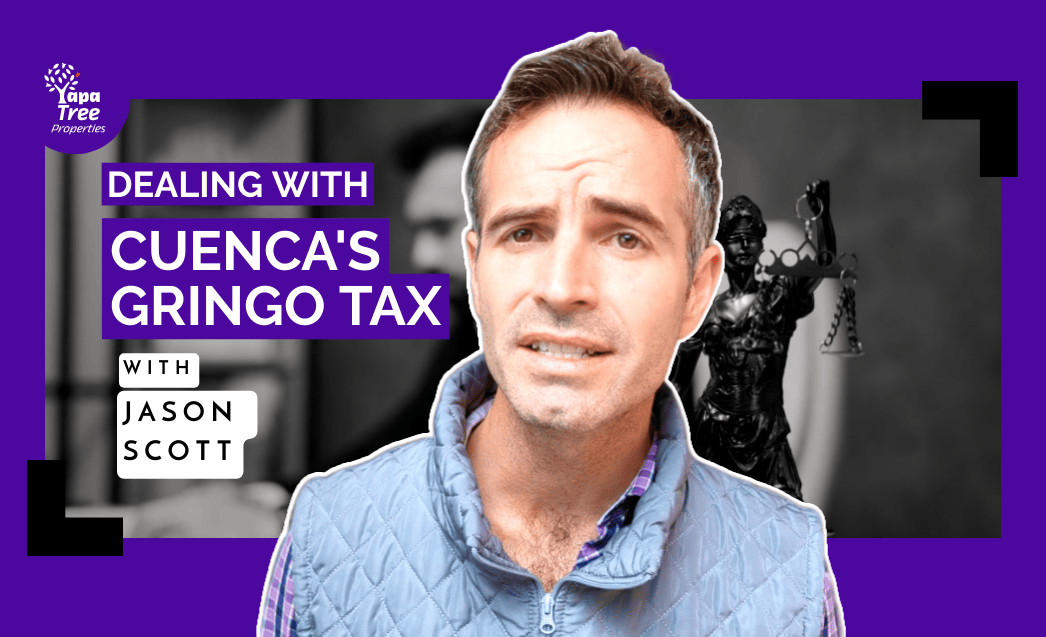




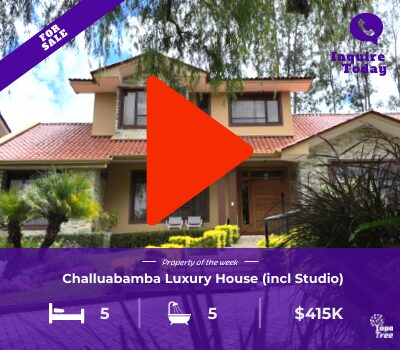



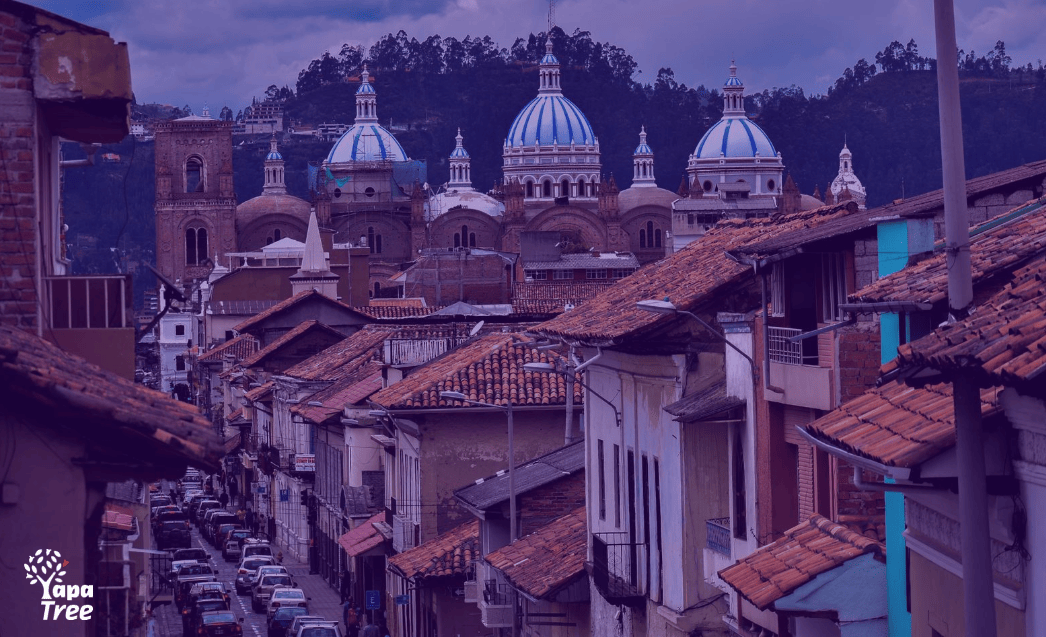
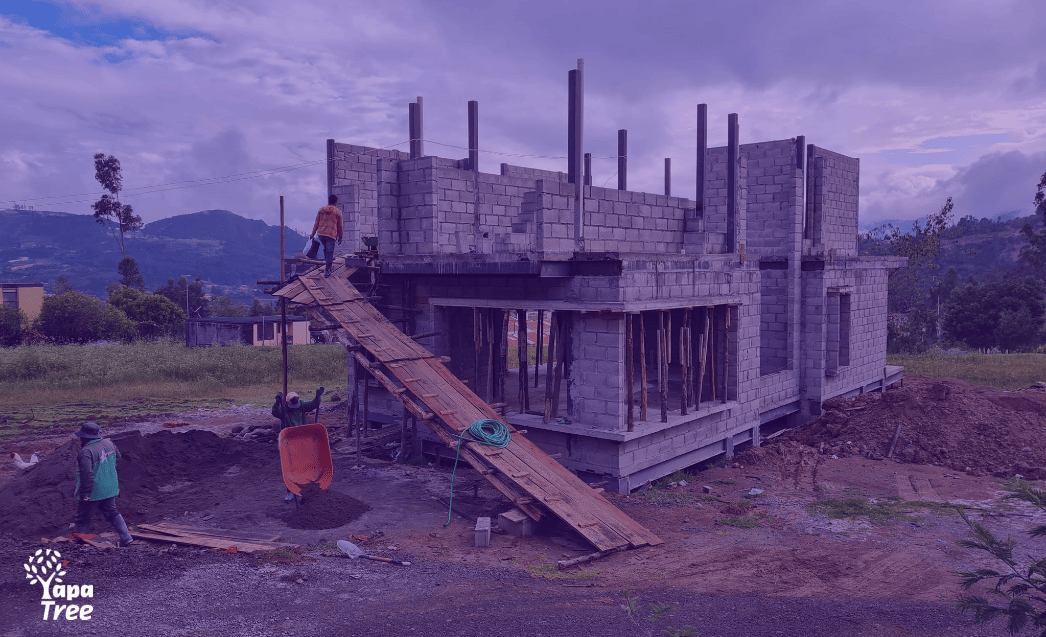
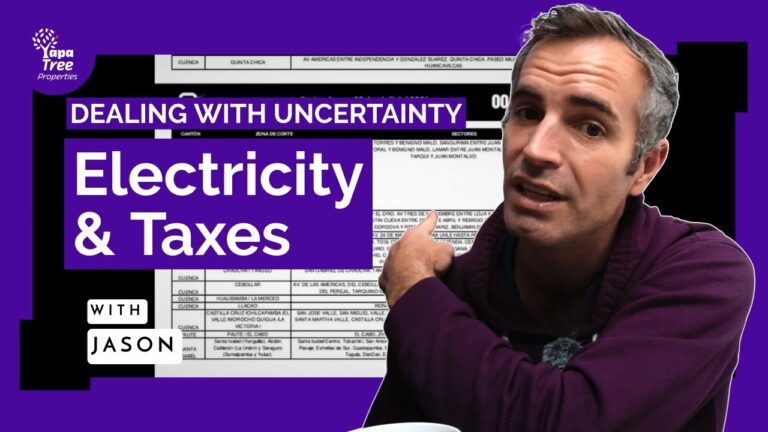

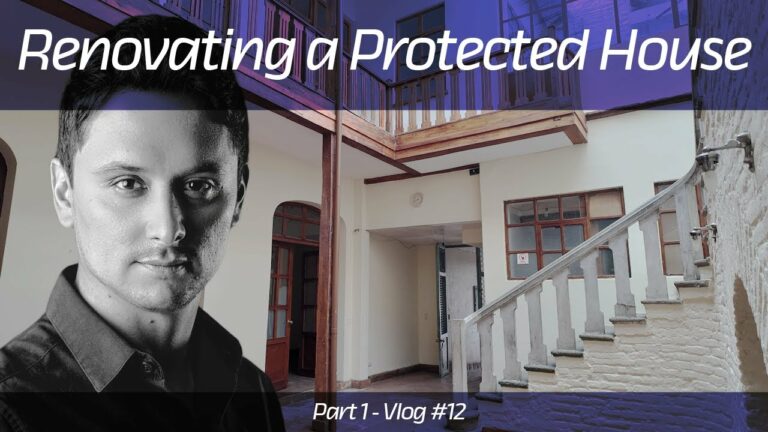

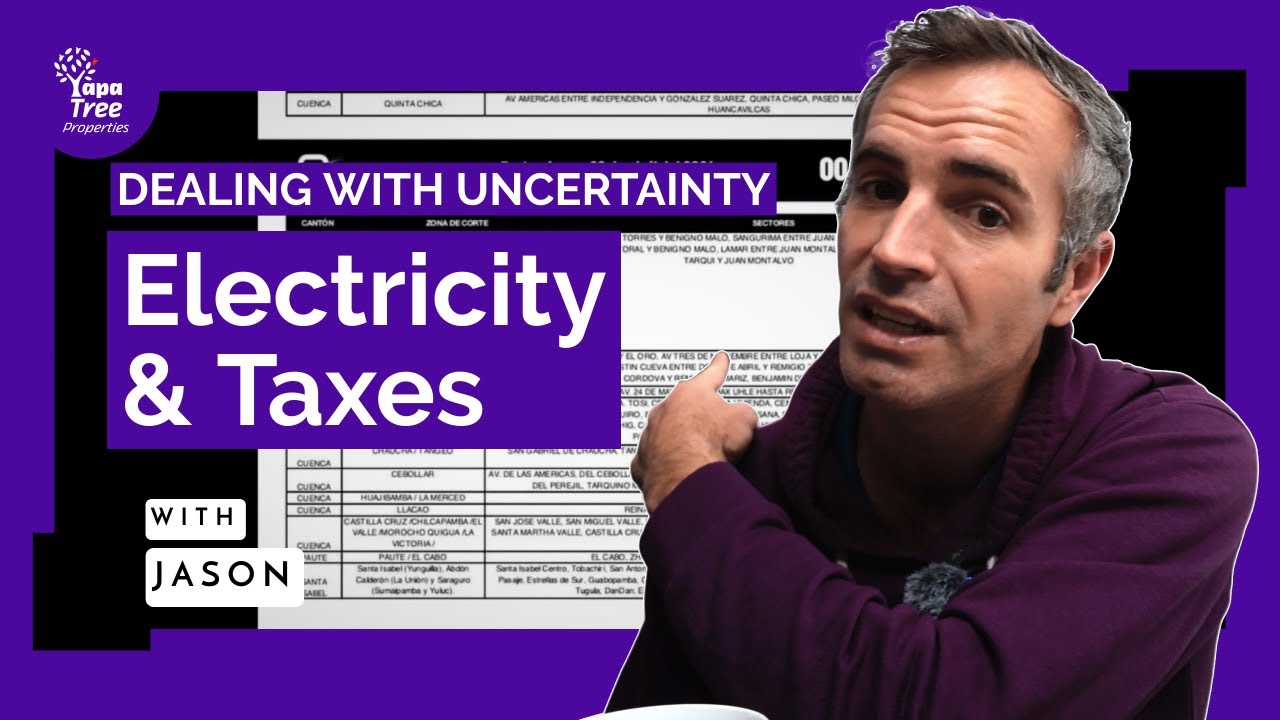

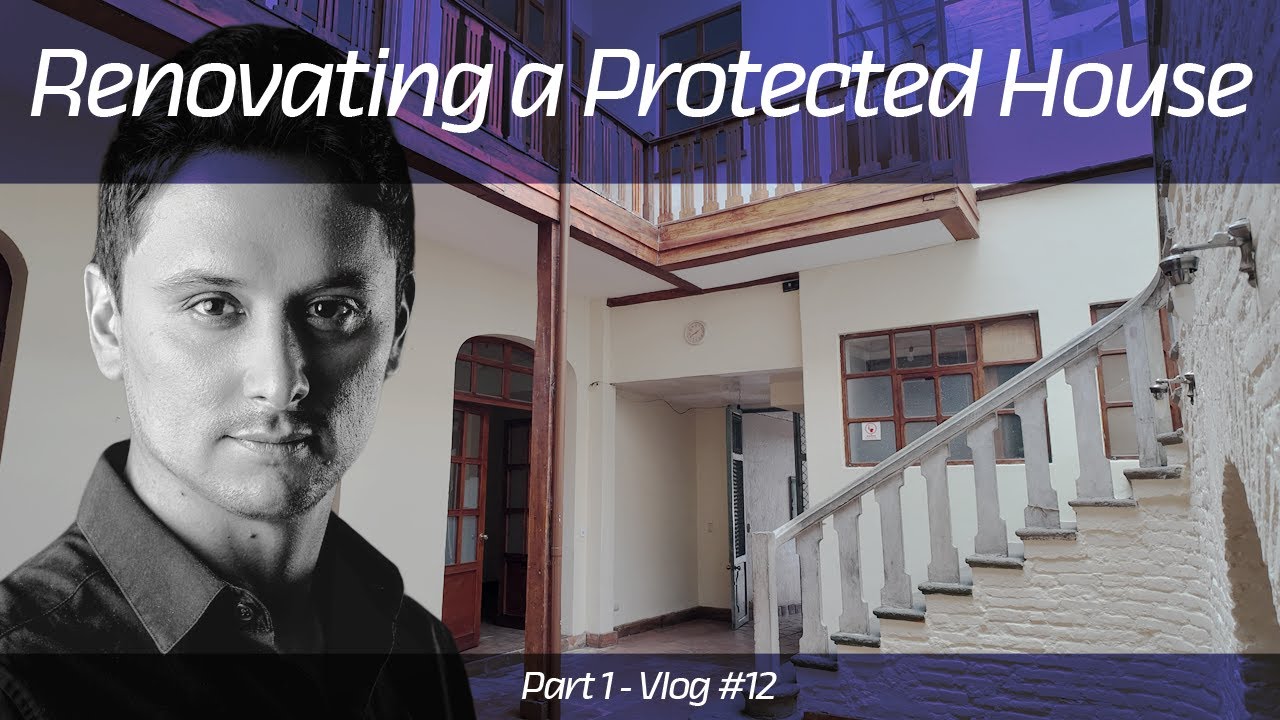

2 Responses
It’s funny but it hasn’t really been the locals trying to overcharge me so much , it’s really been some gringos here who present themselves as being helpful and then I see that they’re shady. I’m fluent in Spanish and am confident in discussing prices but it’s really some gringos I’ve dealt with who have tried to blindside me. That’s more disappointing actually than a local trying to make a few more cents.
Indeed – there’s plenty of ways to be overcharged. There’s also lots of potential miscommunication issues that can exacerbate and confuse too. Hope your issues didn’t derail anything significantly.